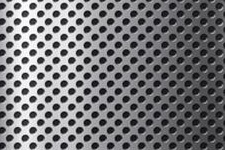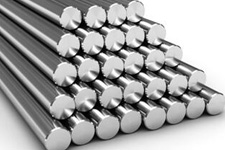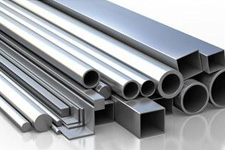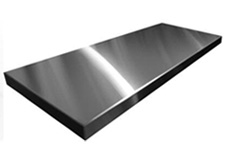Ti-Technical Information
Background
Titanium is absolutely immune to environmental attack, regardless of pollutants. Where other architectural metals exhibit limited lifespan, titanium endures. It withstands urban pollution, marine environments, the sulfur compounds of industrial areas and is failure-proof in even more aggressive environments. Because it is the noblest metal, the coupling of titanium with dissimilar metals does not accelerate galvanic corrosion of the titanium.
These properties make titanium perfect for use in many applications.
Aerospace Applications
Since the advent of the jet engine, titanium has been used in new alloys and production techniques to meet much tighter standards for high-temperature performance, creep resistance, strength, and metallurgical structure.
Through triple melting, or in some cases, electron beam cold hearth melting, the highest quality titanium metal alloys are achieved. These alloys are used in aerospace applications such as engines and airframes.
Jet Engines
Titanium is used for critical jet engine rotating applications. In the newest technology jet engines, wide chord titanium fan blades increase efficiency while reducing noise.
Airframes
In the airframe structural market, innovative alloys replace steel and nickel alloys in landing gear and nacelle applications. These substitutions enable airframe manufacturers to save weight and improve aircraft efficiency.
Aircraft quality plate and sheet are hot-rolled from forged slab. To achieve critical plate flatness vacuum creep flattening is used. Superplastic forming/diffusion bonding has led to increased use of titanium alloy sheet in new airframe designs.
Aircraft quality strip, in commercially pure grades and beta alloys, is produced in coil form with continuous vacuum annealing assuring extremely low hydrogen content.
With each new design, commercial aircraft manufacturers increase the use of titanium in airframes.
Industrial Applications
The industrial uses for titanium are growing faster than ever before as more and more engineers are discovering it can reduce lifecycle costs across a broad range of equipment and processes. Titanium has an exceptionally high strength to weight ratio. Titanium’s favorable density (approximately half that of ferrous and nickel based metals) means that when equipment costs are calculated on a per unit area of measure basis, rather than per pound, the differential cost of material required narrows dramatically. In other words, about half as much titanium is required to do the same job, based on strength, or the same weight of titanium will go twice as far. Further closing the gap, when applied properly, titanium requires no corrosion allowance; pressure and structural requirements for the system are the only criteria for specifying wall thickness. Any remaining higher upfront costs are almost always recouped in multiple due to increased production time and reduced maintenance.
Titanium forms a very tenacious surface oxide layer, which is an outstanding corrosion inhibitor. In many harsh environments, it can outlast competing materials as much as 5:1. Lower failure rates translate to less downtime, reduced maintenance, and total lower cost. As a result, titanium has found a home in numerous industries ranging from power generation to chemical processing to desalination plants.
Power Generation
In power generating plants, where saline, brackish or polluted waters are used as the cooling medium, titanium thin wall condenser
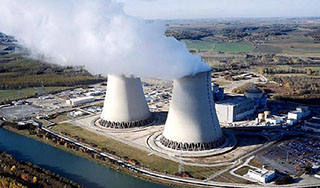
tubing will last for the life of the condenser (with a 40-year warranty against failure under proper conditions) and eliminate the need for
a corrosion allowance.
Chemical Processing
Many chemical processing operations specify titanium to increase equipment life. It offers lifecycle cost advantages over copper, nickel and stainless steel grades while providing initial cost advantages over materials such as high nickel alloys, tantalum, and zirconium.
Petroleum
In petroleum exploration and production, titanium pipe’s light weight and flexibility make it an excellent material for deep sea production risers. In addition, titanium’s immunity to attack by seawater makes it the preferred material for topside water management systems. It is used on existing platforms in the North Sea and many more projects are in the planning stages. And since it shows virtually no corrosion in salt water, titanium is also the material of choice in desalination plants worldwide.
Other Industries
Titanium alloys are used in dozens of other industrial purposes, such as flue gas desulphurization for pollution control, PTA plants for polyester production, pressure vessels, heat exchangers, and hydrometallurgical autoclaves. Each grade is tailored to specific operating conditions, emphasizing strength for different pressures, alloy content for different corrosive agents and ductility for different fabrication requirements.
Emerging Applications
Pursuing, developing and supporting new uses for titanium is a priority for the titanium industry. This includes help for companies that are developing new uses for titanium, by providing dependable metal supply, advanced metallurgical design and expertise, and in some cases capital support.
Computer Industry
In the computer industry, titanium is a promising substrate for hard disk drives. Compared to aluminum, which is the primary material currently used, titanium provides significant advantages. The non-magnetic properties of titanium prevent interference with the data storage process; its ability to withstand heat allows higher temperatures during the coating process, which improves manufacturing rates; and the purity of titanium permits closer read/write head tolerances, increasing disk capacity.
Automotive Industry
In the automotive industry, uses are being developed for titanium in the automotive/motorcycle after markets and racing market. Engine parts such as connecting rods, wrist pins, valves, valve retainers and springs, rocker arms and camshafts, to name a few, lend themselves to fabrication from titanium because it is durable, strong, lightweight and resists heat and corrosion. While titanium initially may be more expensive for these applications, designs that exploit its unique characteristics yield parts that more than pay for themselves with better performance and a longer life.
An all-titanium exhaust system is also being developed to reduce weight and increase longevity. Use of titanium on production vehicles is also being evaluated for engine parts to improve efficiencies and suspension springs to increase interior space.
Geothermal Power
There are new opportunities in geothermal power generation, where highly caustic steam released from the earth is captured to generate electricity. The low lifecycle cost of titanium in these applications provides significant savings compared to competing materials.
Composites
Titanium is being widely used in metal matrix composites. As the cost of fabricating these exceptionally strong, lightweight components declines, their popularity and the utilization of titanium will grow.
Specialised Applications
Promoting unique, non-traditional uses for titanium Titanium’s unique combination of attributes – light weight, high strength, biocompatibility, and durability in extreme environments – make it an excellent material for a variety of non-traditional applications.
Human Implants
Titanium is completely inert to human body fluids, making it ideal for medical replacement structures such as hip and knee implants. Titanium actually allows bone growth to adhere to the implants, so they last longer than those made of other materials. Reconstructive titanium plates and mesh that support broken bones are also commonly used today.
Armor Applications
High strength-to-weight ratio and superior ballistic properties make titanium well suited for armor applications. Used as protective armor on personnel carriers and tanks, it makes the vehicles much lighter, increasing the mobility of the force. Personal armor vests and helmets for police made from titanium are far lighter and more comfortable than those made from competing materials.
Other Applications
Titanium is also now found in a wide variety of consumer products such as jewelry, watch cases, eyeglasses, bicycles, and clocks. The golf industry has found that lightweight titanium club heads can be bigger than those made of steel, enlarging the “sweet spot” of the club and thus increasing distance and accuracy.

